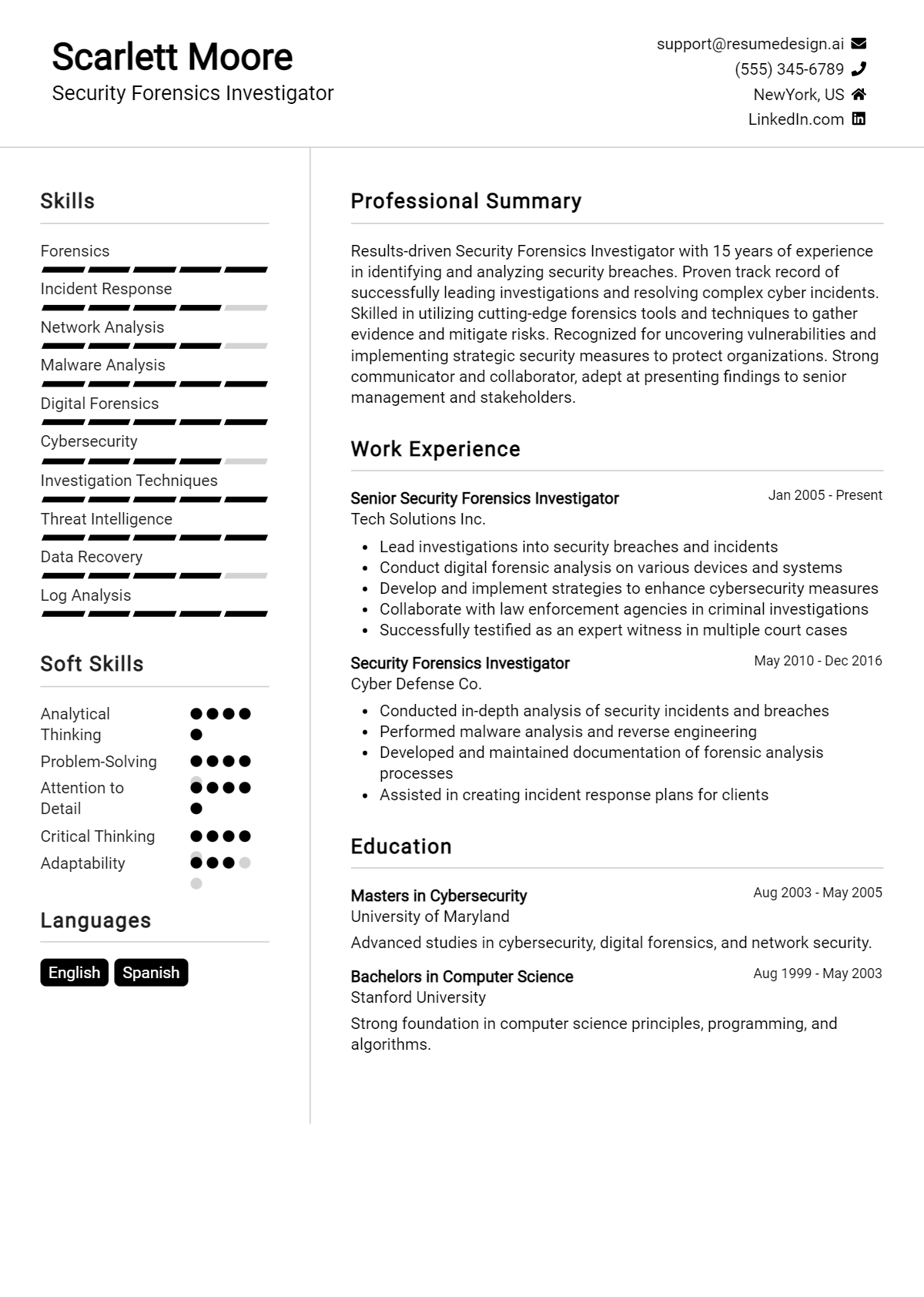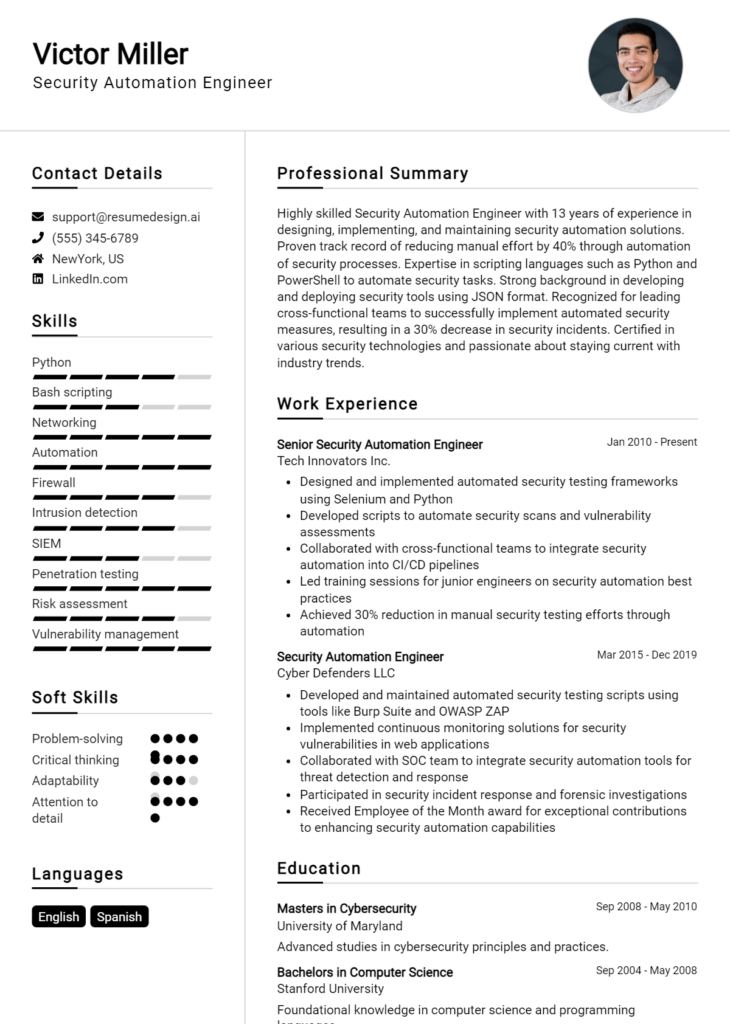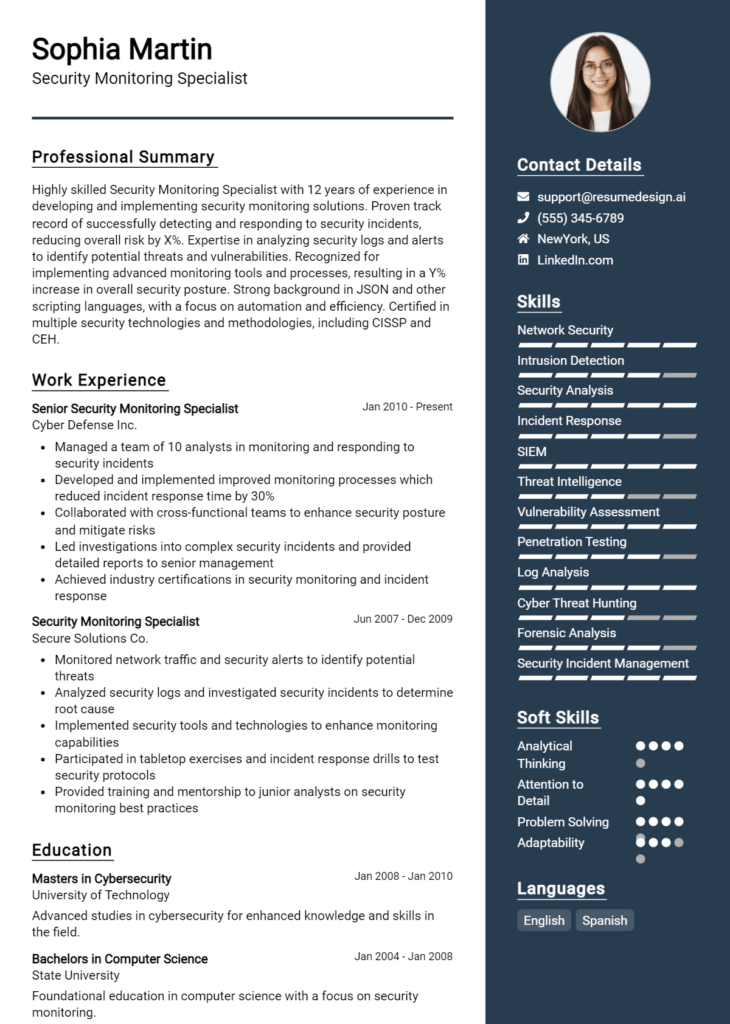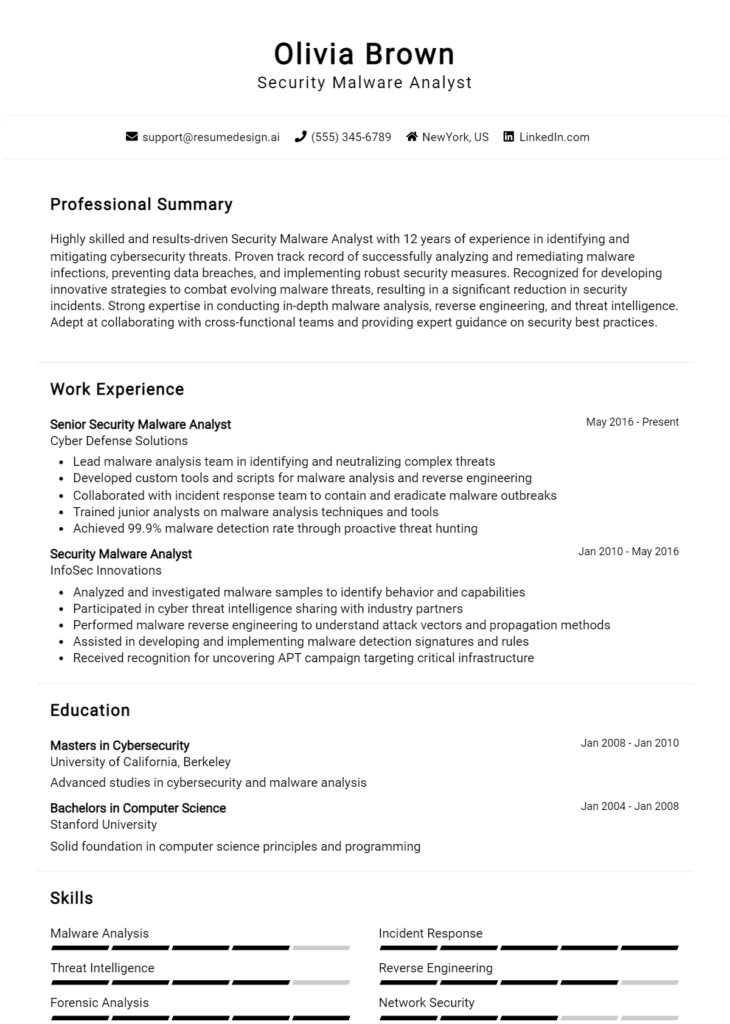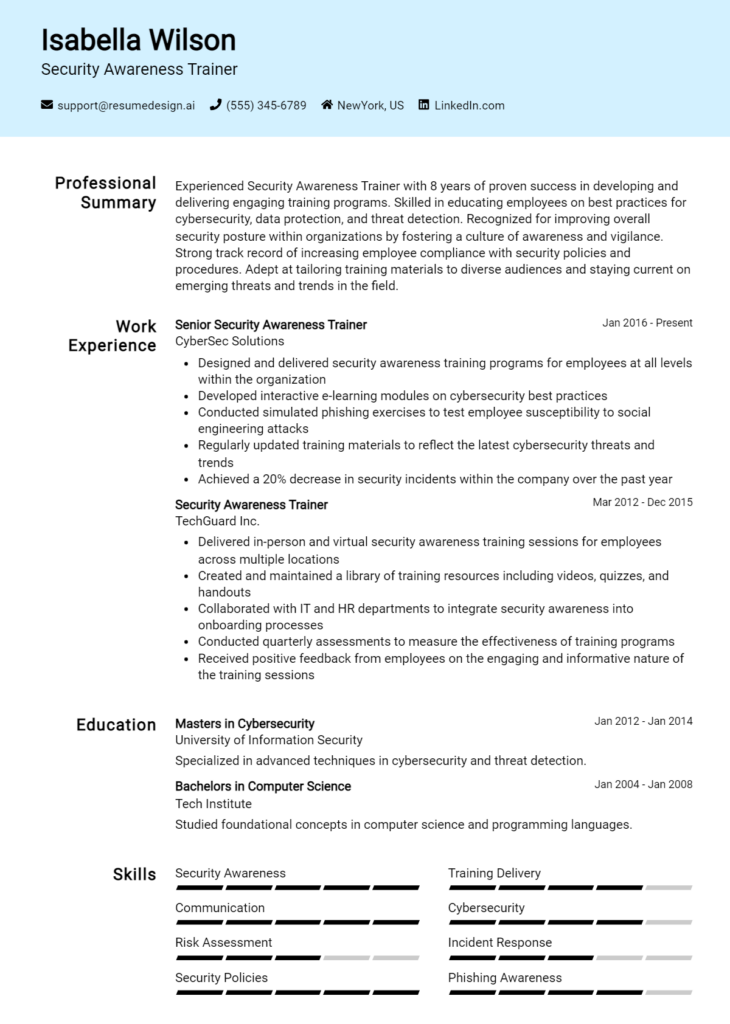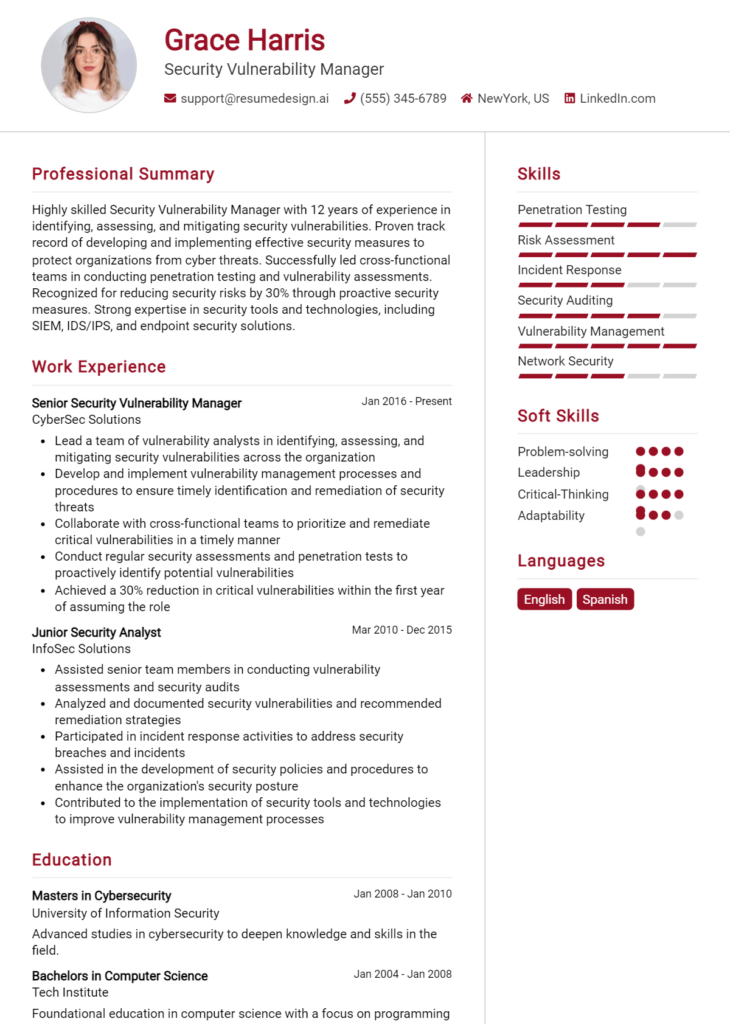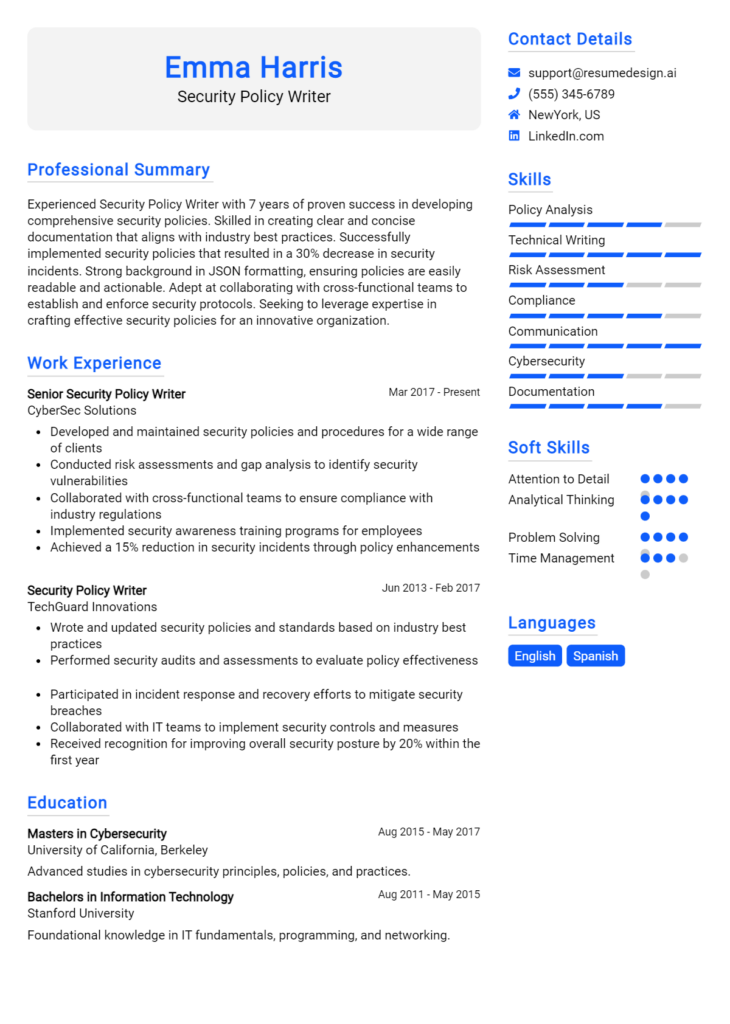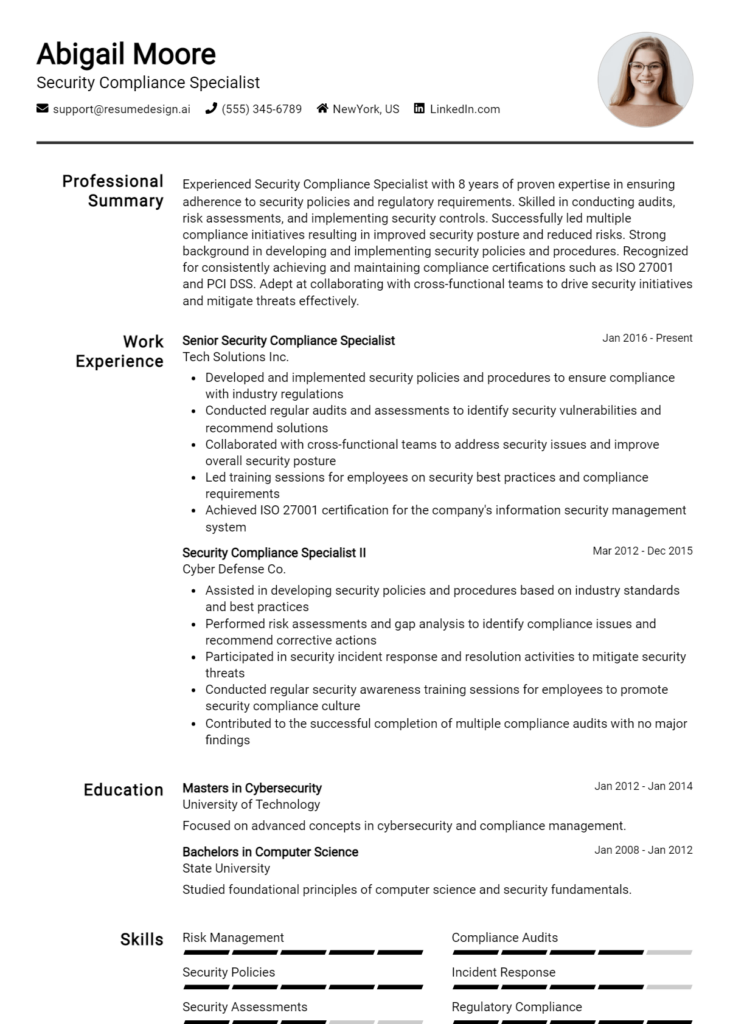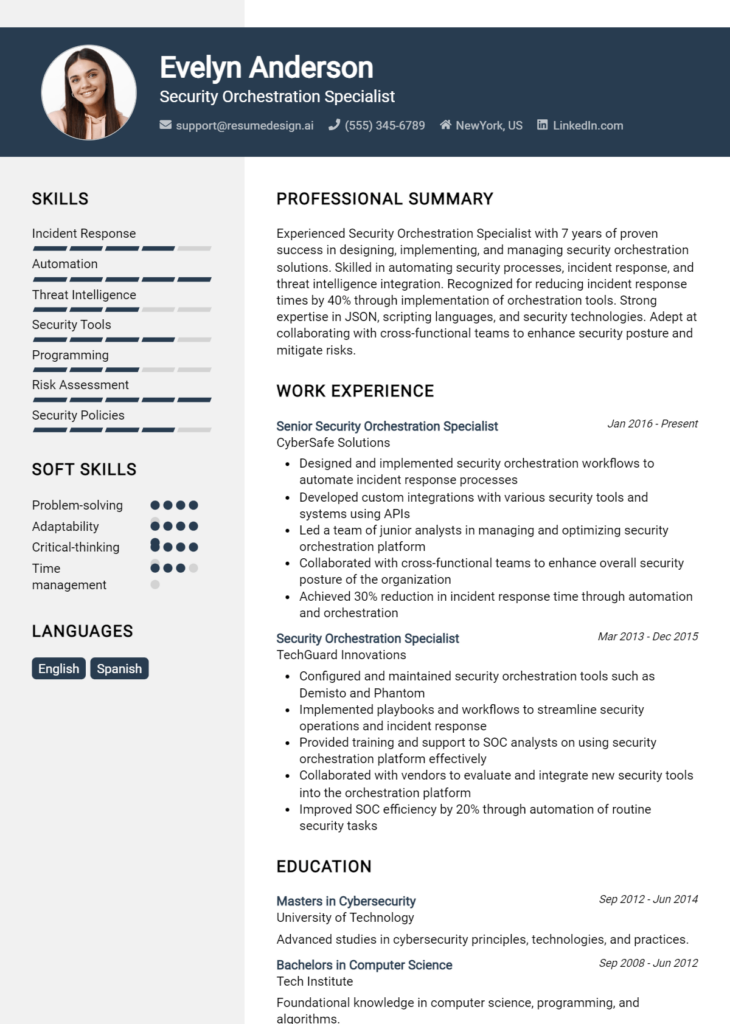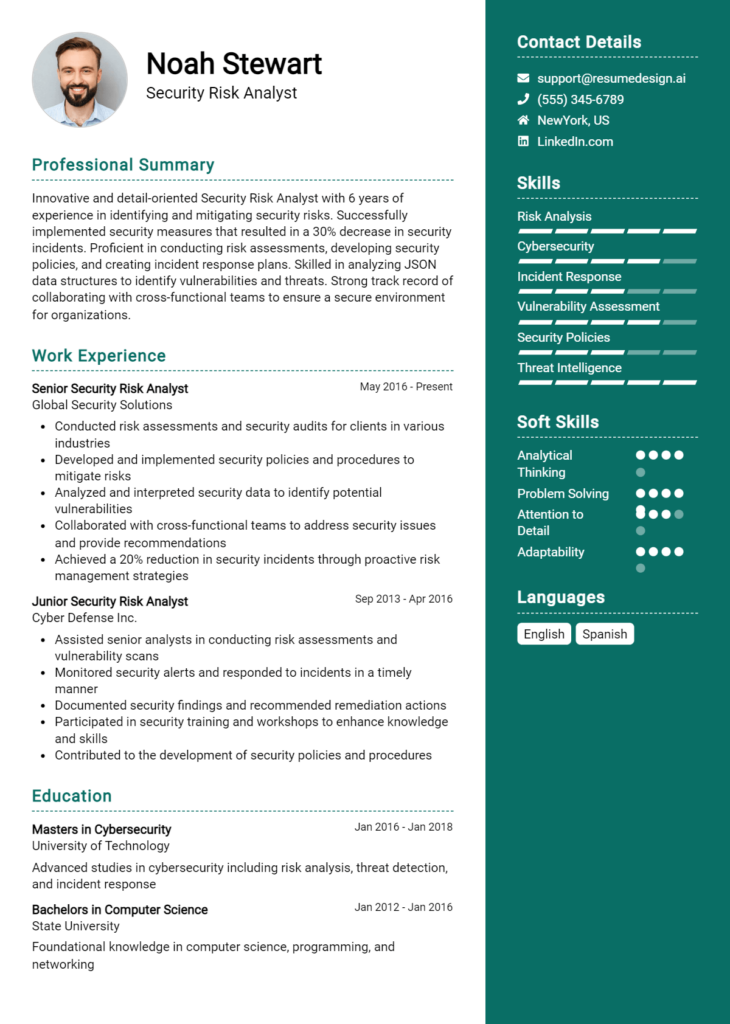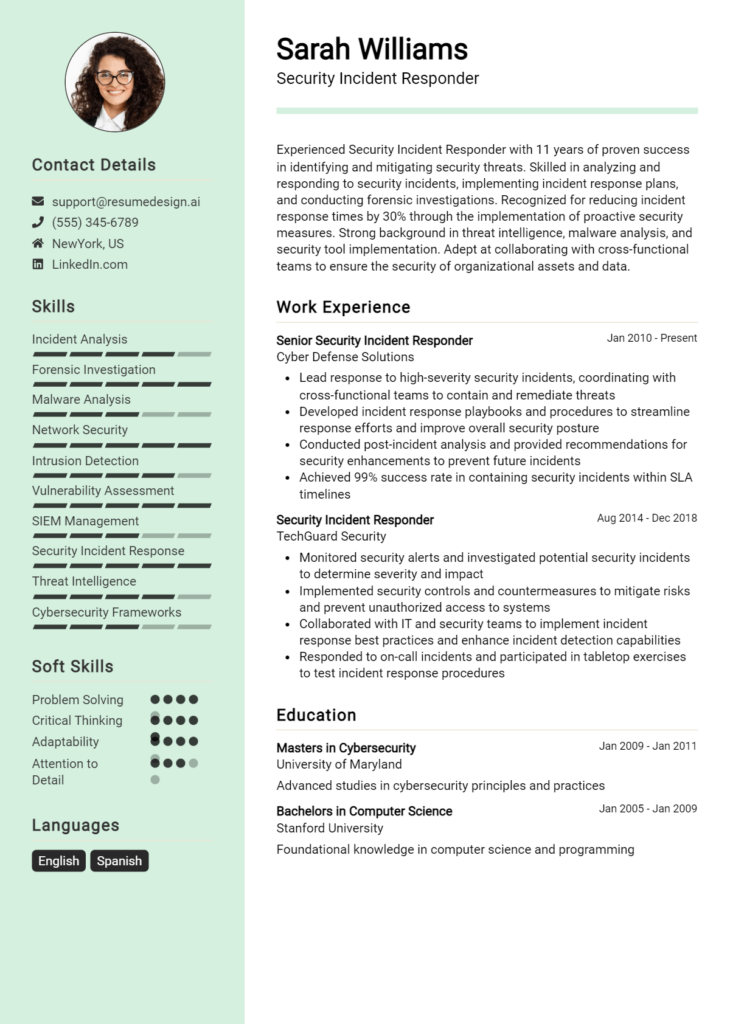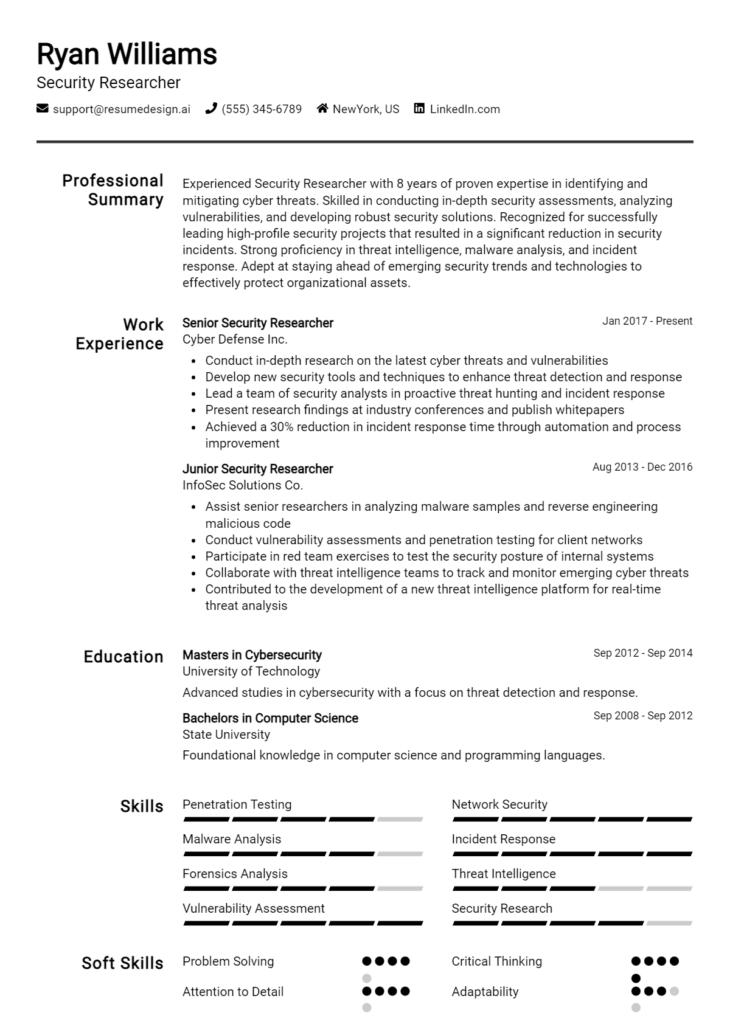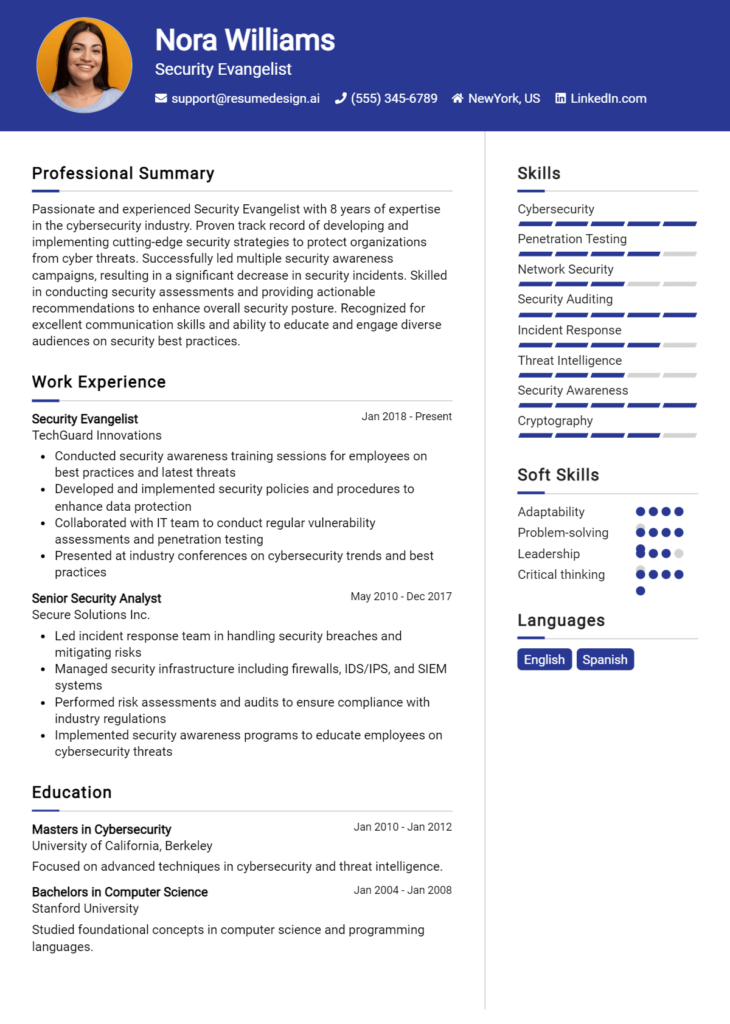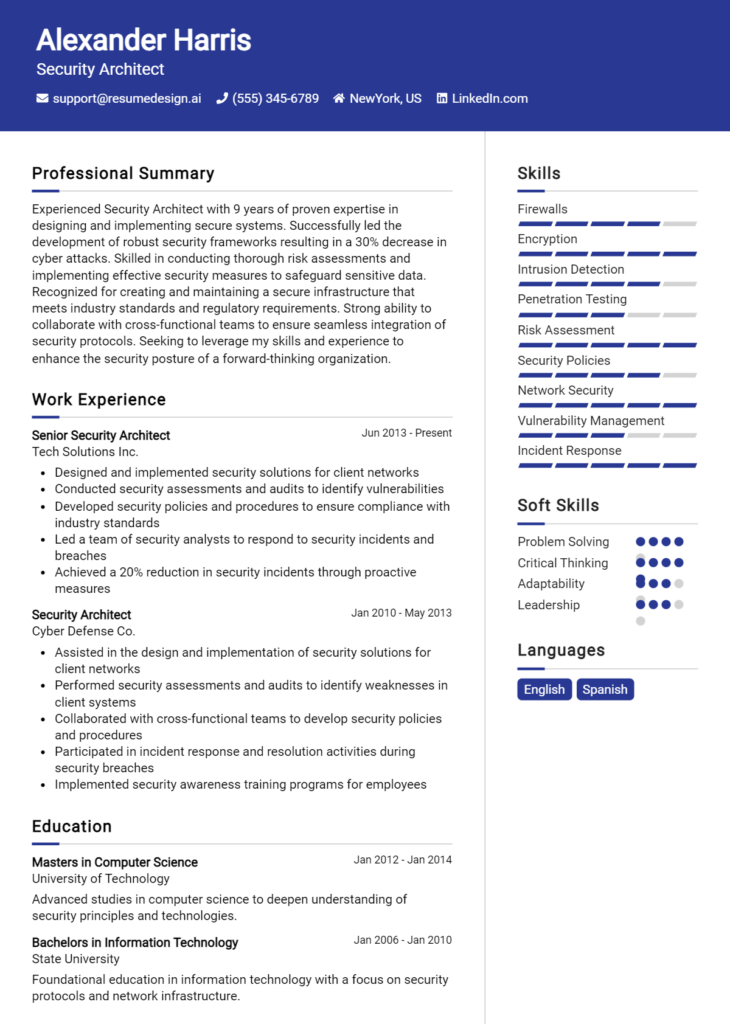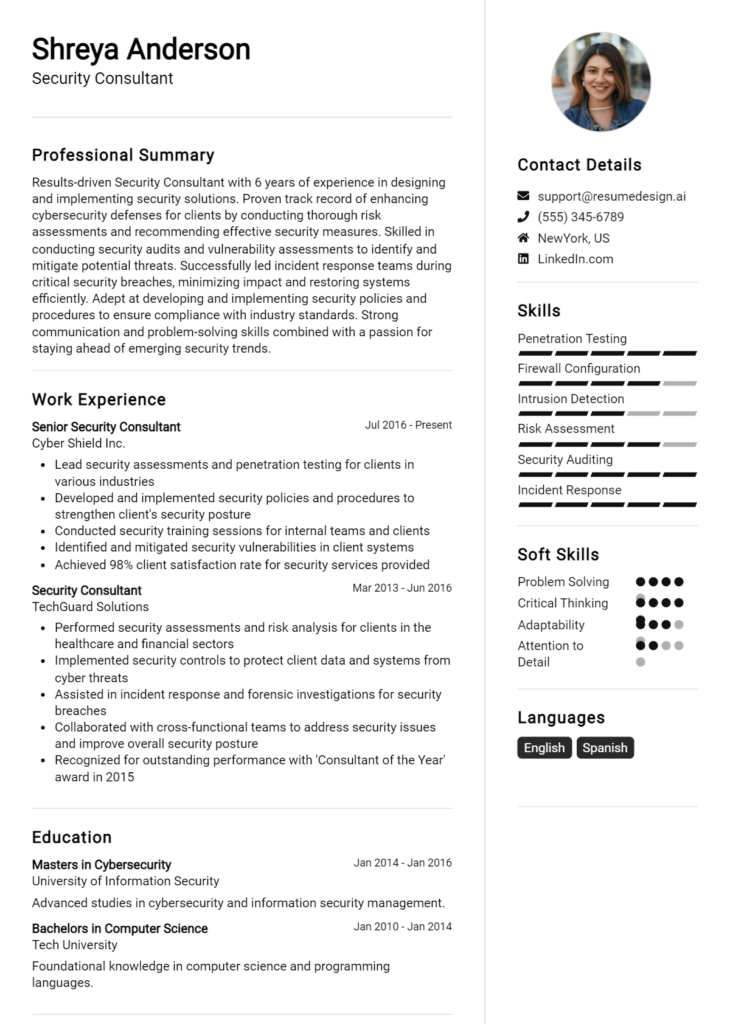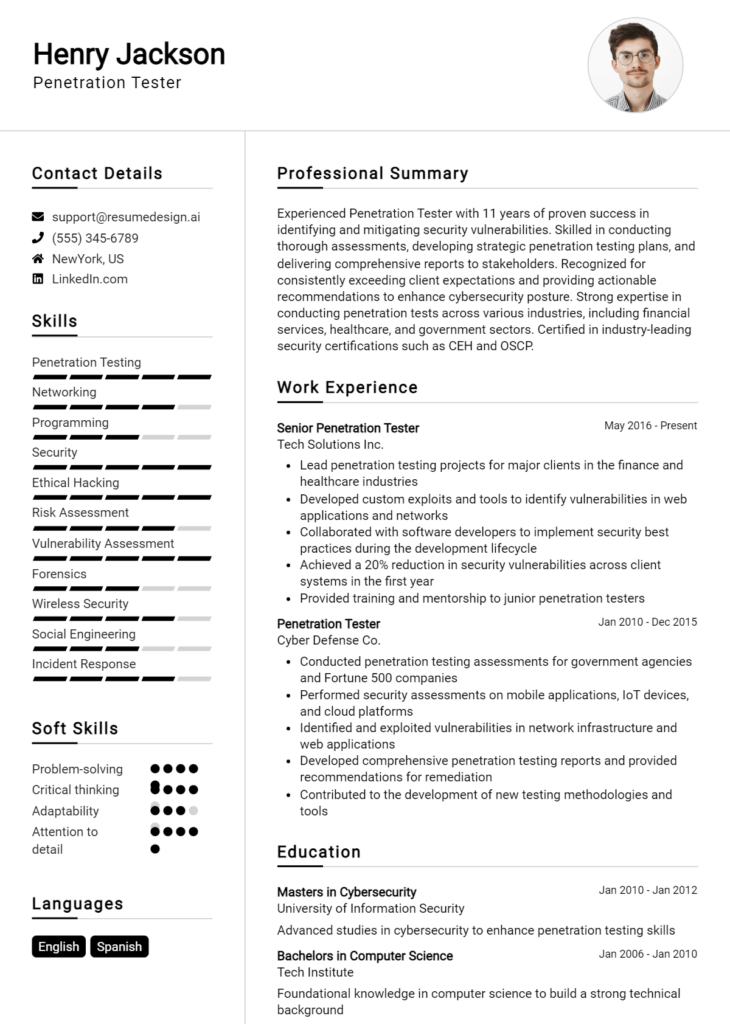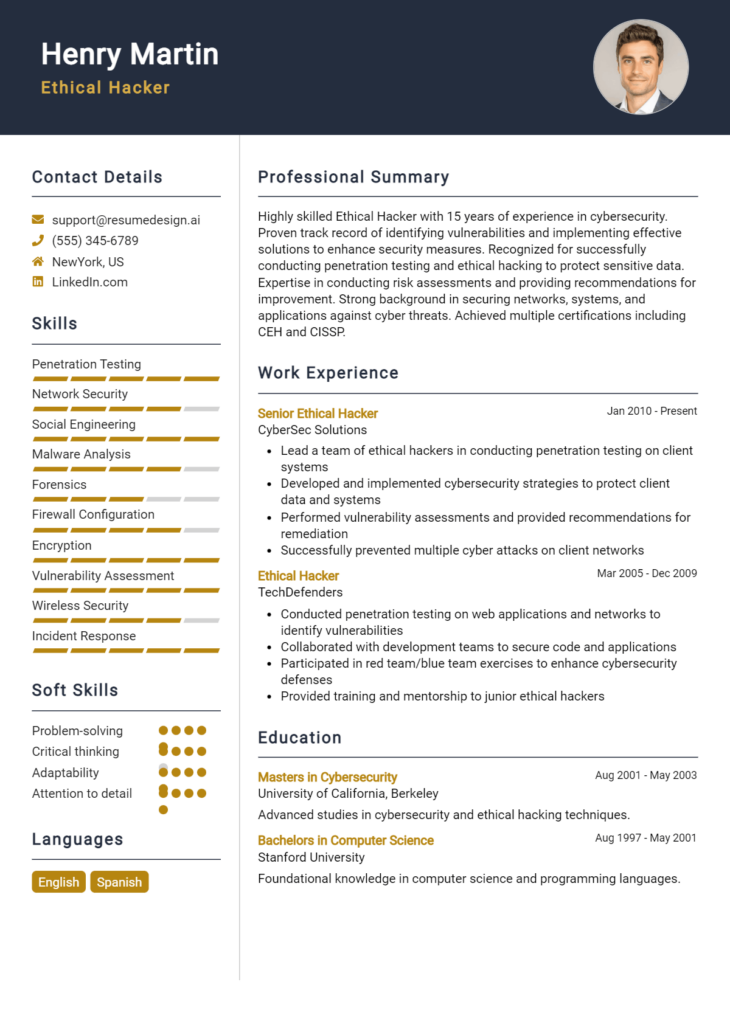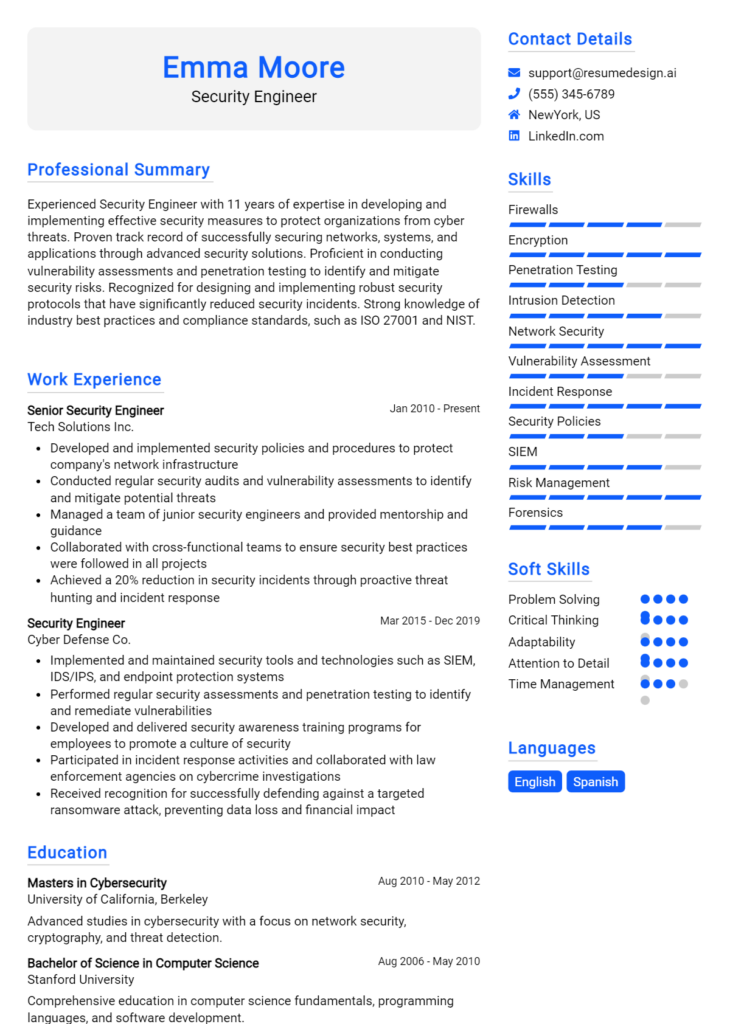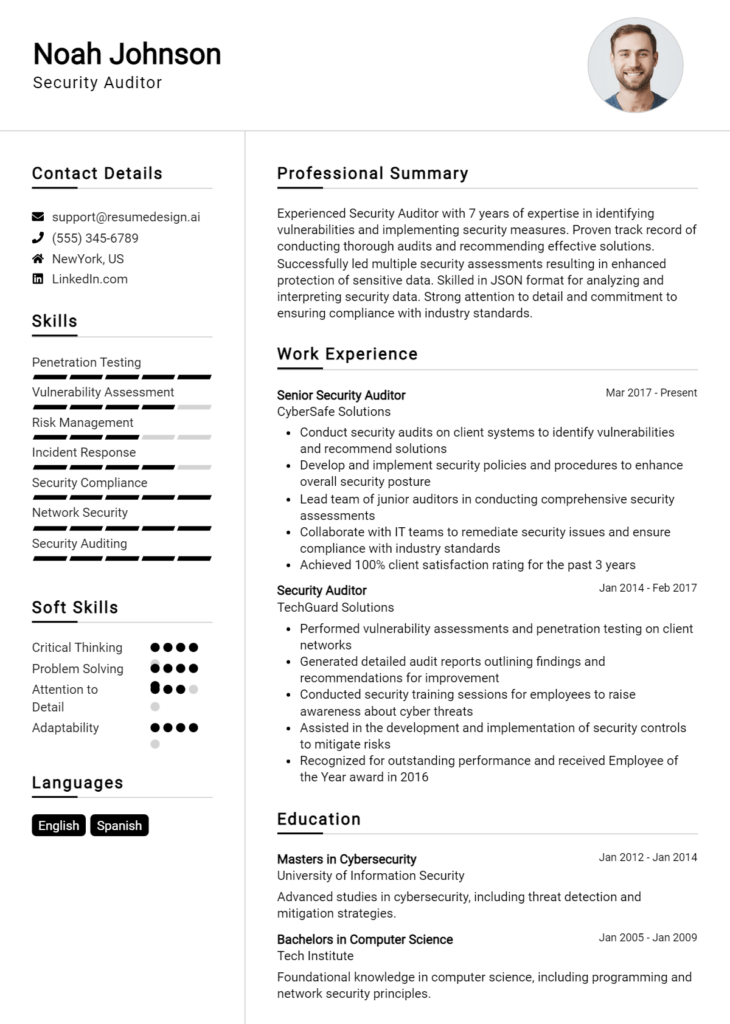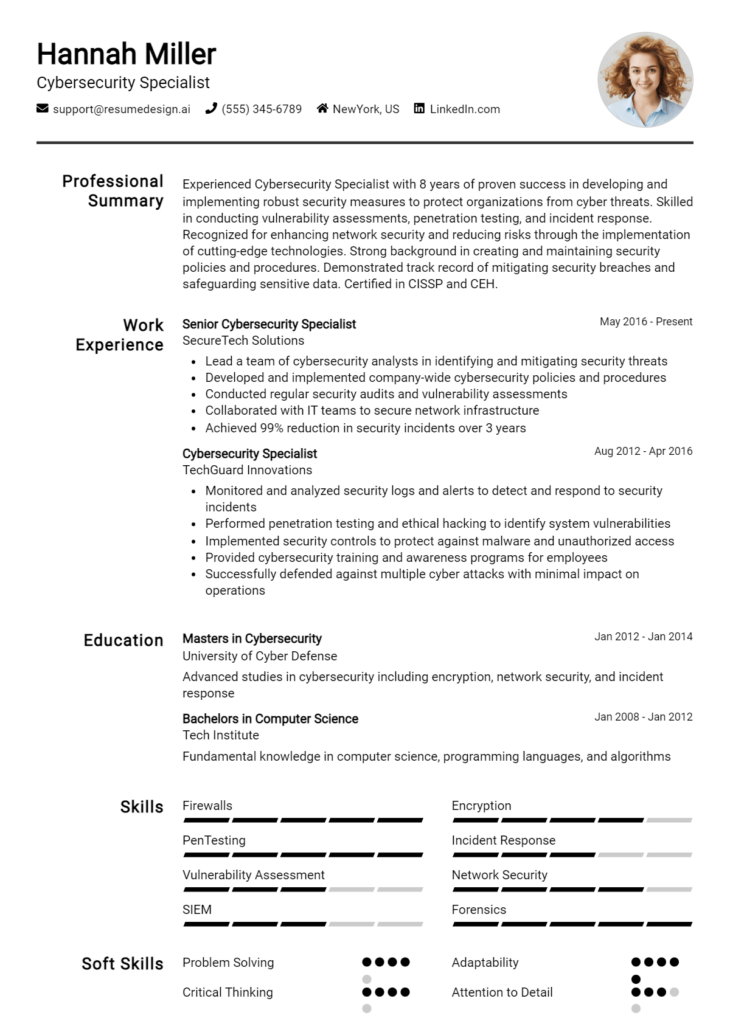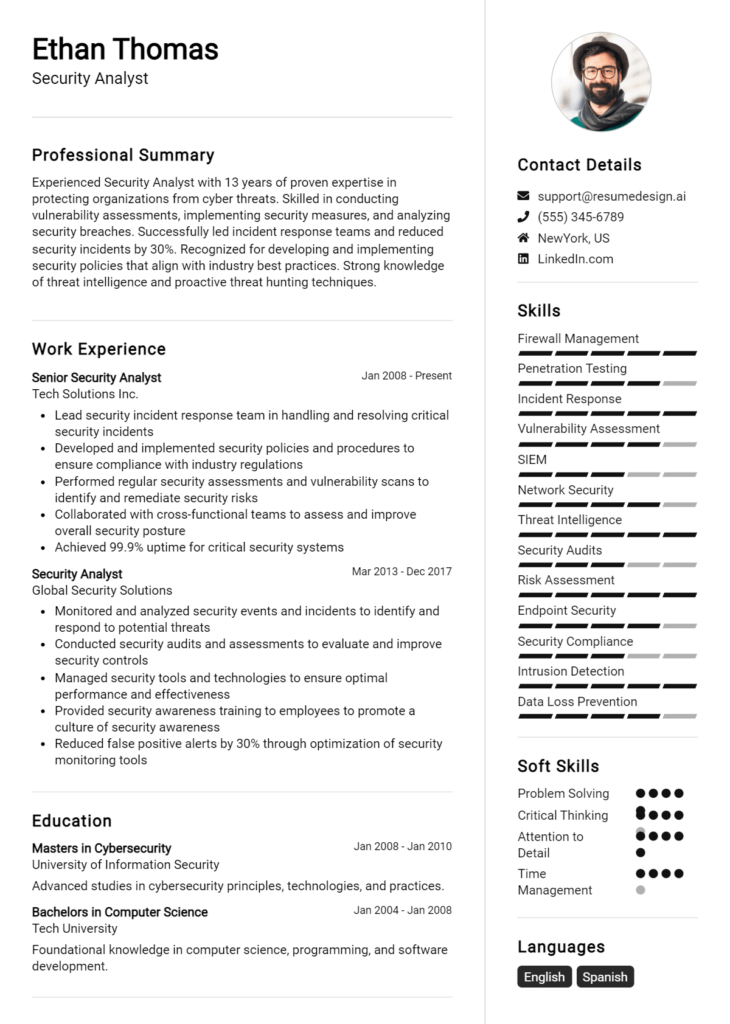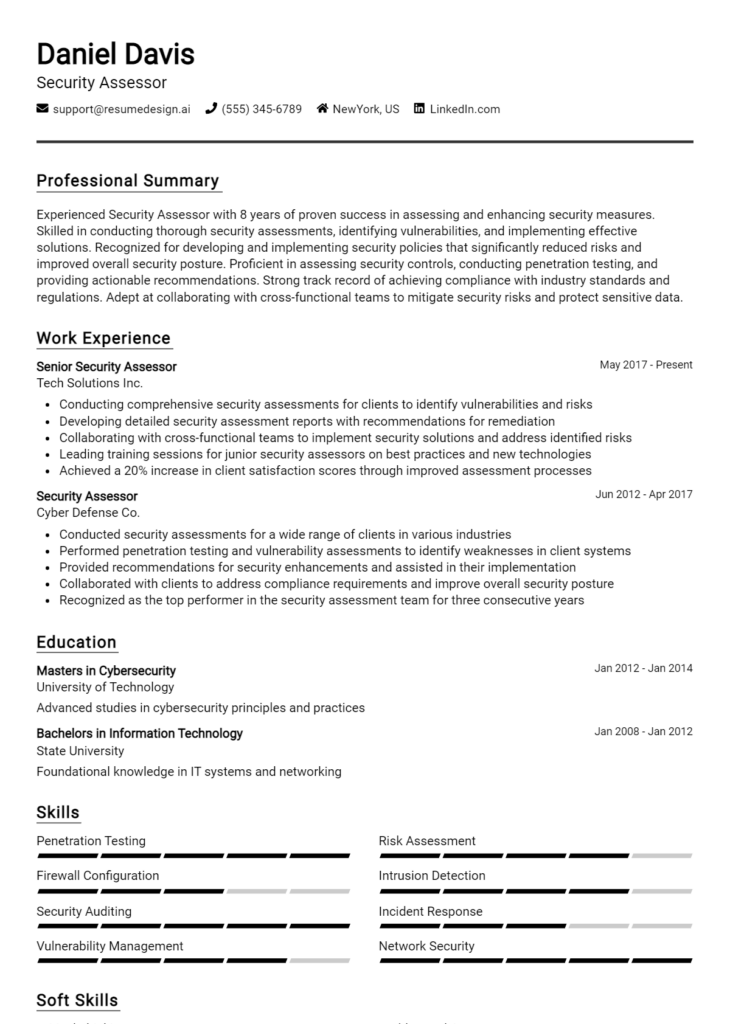Security Forensics Investigator Core Responsibilities
A Security Forensics Investigator plays a crucial role in safeguarding organizational assets by conducting thorough investigations of security breaches and cyber incidents. Key responsibilities include collecting and analyzing digital evidence, collaborating with IT, legal, and management teams, and developing incident response strategies. Essential skills encompass technical proficiency in forensic tools, operational awareness, and advanced problem-solving capabilities. These competencies not only enhance the organization's security posture but also align with its strategic objectives. A well-structured resume can effectively highlight these qualifications, showcasing a candidate's ability to bridge functions and contribute to overall success.
Common Responsibilities Listed on Security Forensics Investigator Resume
- Conduct digital forensic investigations on compromised systems.
- Collect, preserve, and analyze electronic evidence.
- Collaborate with IT and security teams to identify vulnerabilities.
- Document findings in detailed reports for legal and operational use.
- Develop incident response plans and protocols.
- Assist in the creation of security policies and procedures.
- Provide expert testimony in legal proceedings, if necessary.
- Stay updated on cybersecurity trends and emerging threats.
- Conduct training sessions for staff on security awareness.
- Evaluate and recommend forensic tools and technologies.
- Engage with law enforcement agencies during investigations.
- Perform risk assessments and security audits.
High-Level Resume Tips for Security Forensics Investigator Professionals
In the competitive field of Security Forensics Investigation, a well-crafted resume is not just a document; it's your first chance to make a lasting impression on potential employers. Your resume serves as a vital marketing tool that needs to effectively communicate your skills, achievements, and suitability for the role. Given the technical nature of the job and the high stakes involved, it’s essential that your resume reflects not only your qualifications but also your understanding of the industry. This guide will provide practical and actionable tips specifically tailored for Security Forensics Investigator professionals, helping you to create a standout resume that captures the attention of hiring managers.
Top Resume Tips for Security Forensics Investigator Professionals
- Tailor your resume for each job application by aligning your skills and experiences with the job description.
- Highlight relevant experience in security investigations, digital forensics, and incident response, using specific examples.
- Quantify your achievements by including metrics, such as the number of investigations conducted or the percentage of cases solved.
- Showcase industry-specific skills, such as knowledge of forensic tools (e.g., EnCase, FTK) and methodologies.
- Include certifications relevant to the field, such as Certified Information Systems Security Professional (CISSP) or Certified Forensic Computer Examiner (CFCE).
- Utilize action verbs to describe your responsibilities and contributions, making your experiences more dynamic and engaging.
- Incorporate keywords from the job description to improve your resume's visibility in applicant tracking systems.
- Keep your layout clean and professional, ensuring that your resume is easy to read and visually appealing.
- Consider adding a summary statement that encapsulates your expertise and career goals in Security Forensics.
By implementing these tips, you can significantly increase your chances of landing a job in the Security Forensics Investigator field. A well-optimized resume not only showcases your qualifications but also demonstrates your attention to detail and commitment to the profession, making you a more attractive candidate to potential employers.
Why Resume Headlines & Titles are Important for Security Forensics Investigator
In the competitive field of cybersecurity, a Security Forensics Investigator plays a crucial role in identifying, analyzing, and mitigating security threats and breaches. To stand out in such a specialized area, the importance of an impactful resume headline or title cannot be overstated. A strong headline can immediately capture the attention of hiring managers, succinctly summarizing a candidate's key qualifications and expertise in just a few words. It should be concise, relevant, and tailored to the specific job being applied for, effectively setting the tone for the rest of the resume and enticing employers to learn more about the candidate’s skills and experiences.
Best Practices for Crafting Resume Headlines for Security Forensics Investigator
- Be concise: Limit your headline to one or two lines for maximum impact.
- Use keywords: Incorporate industry-specific terms that match the job description.
- Highlight key qualifications: Focus on the most relevant skills or achievements that define your expertise.
- Be role-specific: Tailor your headline to the specific position you are applying for.
- Showcase certifications: Include relevant credentials or certifications to enhance credibility.
- Use action-oriented language: Begin with strong verbs to convey confidence and proactivity.
- Consider your audience: Think about what hiring managers in the cybersecurity field are looking for.
- Avoid jargon: While it's important to use industry terms, ensure your headline remains clear and understandable.
Example Resume Headlines for Security Forensics Investigator
Strong Resume Headlines
Expert Security Forensics Investigator with 5+ Years of Experience in Cybercrime Analysis
Certified Digital Forensics Specialist Focused on Incident Response and Threat Mitigation
Results-Driven Security Analyst with Proven Success in Breach Investigation and Data Recovery
Weak Resume Headlines
Experienced Worker in Cybersecurity
Looking for a Job in Security
The strong headlines are effective because they provide specific information about the candidate’s experience, skills, and focus areas, demonstrating a clear alignment with the role of a Security Forensics Investigator. They utilize industry jargon appropriately, making them relevant and compelling. In contrast, the weak headlines lack specificity and do not convey the candidate's qualifications or unique value proposition, failing to catch the attention of hiring managers who are seeking qualified professionals for their cybersecurity teams.
Writing an Exceptional Security Forensics Investigator Resume Summary
A well-crafted resume summary is crucial for a Security Forensics Investigator, as it serves as the first impression to potential employers. In the competitive field of cybersecurity, hiring managers often sift through numerous applications, and a strong summary can quickly capture their attention. By effectively showcasing key skills, relevant experience, and notable accomplishments, the summary sets the tone for the rest of the resume. It should be concise, impactful, and tailored specifically to the job the candidate is applying for, ensuring that it resonates with the requirements and expectations outlined in the job description.
Best Practices for Writing a Security Forensics Investigator Resume Summary
- Quantify achievements to demonstrate the impact of your work.
- Focus on relevant skills, such as analytical thinking, technical proficiency, and investigative techniques.
- Tailor the summary to match the specific job description, incorporating keywords from the posting.
- Keep it concise, ideally within 3-5 sentences.
- Highlight certifications and specialized training relevant to forensics and cybersecurity.
- Use strong action verbs to convey confidence and proactivity.
- Emphasize your problem-solving abilities and experience in handling complex investigations.
- Showcase collaboration skills, especially if you have worked in teams or with law enforcement agencies.
Example Security Forensics Investigator Resume Summaries
Strong Resume Summaries
Detail-oriented Security Forensics Investigator with over 6 years of experience in digital forensics and incident response. Successfully led investigations that resulted in a 40% reduction in data breach incidents for a Fortune 500 company, employing advanced forensic techniques and tools.
Results-driven investigator skilled in analyzing complex cyber incidents, with a proven track record of recovering over 90% of compromised data in the past year. Holds multiple certifications, including Certified Information Systems Security Professional (CISSP) and Certified Cyber Forensics Professional (CCFP).
Proficient Security Forensics Investigator with a robust background in malware analysis and network security. Spearheaded a team that identified and neutralized threats, achieving a 30% faster response time to incidents during the last fiscal year.
Weak Resume Summaries
Experienced in security investigations and forensics. Good at solving problems and working with teams.
Security professional with some experience in forensics and investigations. Looking for a new opportunity in the field.
The strong resume summaries are effective because they provide specific achievements, quantify results, and highlight relevant skills and certifications that directly relate to the Security Forensics Investigator role. In contrast, the weak summaries lack detail, are generic, and do not offer any measurable outcomes or specific skills, making them less compelling to hiring managers.
Work Experience Section for Security Forensics Investigator Resume
The work experience section of a Security Forensics Investigator resume is crucial as it serves as a testament to the candidate's technical skills and practical knowledge in the field. This section not only highlights the ability to manage teams and collaborate effectively but also showcases the delivery of high-quality investigative products. By quantifying achievements and aligning work experience with industry standards, candidates can demonstrate their impact and value, making it essential for standing out in a competitive job market.
Best Practices for Security Forensics Investigator Work Experience
- Highlight specific technical skills related to cybersecurity, digital forensics, and incident response.
- Quantify results by including metrics such as the number of incidents resolved, percentage of successful investigations, or cost savings achieved.
- Emphasize leadership roles and team management experiences to showcase your capacity to guide and mentor others.
- Include relevant tools and technologies used in investigations, such as forensic software, data analysis tools, and security protocols.
- Demonstrate collaboration with other departments or stakeholders, emphasizing cross-functional teamwork.
- Tailor your work experience descriptions to align with industry standards and job requirements.
- Use action verbs to convey a sense of proactivity and achievement in your responsibilities.
- Focus on the outcomes of your work, not just the tasks performed, to highlight your impact in previous roles.
Example Work Experiences for Security Forensics Investigator
Strong Experiences
- Led a cross-functional team to investigate and resolve over 200 security incidents, achieving a 95% resolution rate within the first 48 hours.
- Implemented advanced forensic analysis techniques that resulted in a 30% reduction in incident response time and improved detection of insider threats.
- Developed and delivered training programs for junior investigators, enhancing team performance and increasing overall investigation efficiency by 20%.
- Collaborated with law enforcement agencies on high-profile cybercrime investigations, leading to successful prosecutions and recovery of stolen assets valued at over $1 million.
Weak Experiences
- Worked on various investigations with little detail on outcomes or specific contributions.
- Assisted in security tasks without specifying the technologies or methods used.
- Participated in team meetings and discussions but did not highlight any leadership or impactful contributions.
- Handled some cases that were resolved without quantifying success or learning outcomes.
The examples provided illustrate a clear distinction between strong and weak experiences. Strong experiences are characterized by specific, quantifiable achievements and demonstrate leadership, technical expertise, and collaboration. In contrast, weak experiences lack detail and fail to convey the candidate's impact or contributions, making it difficult for potential employers to assess their capabilities.
Education and Certifications Section for Security Forensics Investigator Resume
The education and certifications section of a Security Forensics Investigator resume is crucial in establishing the candidate's academic foundation and professional qualifications. This section not only showcases relevant degrees and industry certifications but also underscores the candidate's commitment to continuous learning and staying updated with the latest advancements in the field. By including pertinent coursework and specialized training, candidates can significantly enhance their credibility and demonstrate their alignment with the specific requirements of the job role, making them more appealing to potential employers.
Best Practices for Security Forensics Investigator Education and Certifications
- Highlight degrees that are directly related to cybersecurity, information technology, or criminal justice.
- Include industry-recognized certifications such as Certified Information Systems Security Professional (CISSP) or Certified Ethical Hacker (CEH).
- Provide a brief description of relevant coursework that pertains to forensic analysis, cyber law, or incident response.
- List any specialized training programs attended, such as digital forensics workshops or cybersecurity boot camps.
- Ensure that the certifications are up-to-date and reflect current industry standards and practices.
- Organize the section chronologically or by relevance to make it easy for hiring managers to assess qualifications.
- Incorporate any awards or honors received during educational pursuits that relate to forensics or cybersecurity.
- Tailor the education and certifications section to match the specific job description requirements whenever possible.
Example Education and Certifications for Security Forensics Investigator
Strong Examples
- Bachelor of Science in Cybersecurity, University of Technology, 2021
- Certified Information Systems Security Professional (CISSP), 2022
- Digital Forensics and Investigations Certification, 2023
- Relevant coursework: Cyber Crime, Digital Evidence Management, and Network Security Fundamentals.
Weak Examples
- Bachelor of Arts in English Literature, University of Arts, 2018
- Certification in Basic Computer Skills, 2019
- Completed an outdated course on General Networking Principles, 2015
- High School Diploma, 2010 (included without further qualifications).
The examples provided demonstrate a clear distinction between strong and weak qualifications. Strong examples showcase relevant degrees, current certifications, and specialized coursework that directly pertain to the field of security forensics, thereby enhancing the candidate's suitability for the role. In contrast, weak examples reflect qualifications that lack relevance to the job, such as degrees in unrelated fields or outdated certifications that do not contribute to the candidate's expertise in security forensics, ultimately diminishing their appeal to potential employers.
Top Skills & Keywords for Security Forensics Investigator Resume
In the field of security forensics, having a well-crafted resume is essential for showcasing your capabilities to potential employers. The skills you list play a crucial role in demonstrating your expertise and suitability for the position of a Security Forensics Investigator. Employers look for candidates who possess a balanced mix of hard and soft skills, as both are vital for investigating cyber crimes, analyzing data, and communicating findings effectively. A strong emphasis on relevant skills can set you apart from other applicants and significantly enhance your chances of landing an interview. For those interested in refining their resume, exploring the importance of skills and work experience can provide valuable insights into what employers are seeking.
Top Hard & Soft Skills for Security Forensics Investigator
Soft Skills
- Analytical Thinking
- Attention to Detail
- Problem-Solving
- Communication Skills
- Team Collaboration
- Adaptability
- Time Management
- Critical Thinking
- Ethical Judgment
- Interpersonal Skills
Hard Skills
- Digital Forensics Tools (e.g., EnCase, FTK)
- Malware Analysis
- Network Security Protocols
- Incident Response
- Data Recovery Techniques
- Cybersecurity Frameworks (e.g., NIST, ISO)
- Operating System Forensics (e.g., Windows, Linux)
- Evidence Collection and Preservation
- Threat Intelligence Analysis
- Scripting Languages (e.g., Python, PowerShell)
Stand Out with a Winning Security Forensics Investigator Cover Letter
Dear Hiring Manager,
I am writing to express my interest in the Security Forensics Investigator position at [Company Name] as advertised on [Job Board/Company Website]. With a robust background in digital forensics and cybersecurity, coupled with my passion for uncovering the truth behind security breaches, I am confident in my ability to contribute effectively to your team. My experience in investigating cyber incidents, analyzing digital evidence, and collaborating with law enforcement has equipped me with the skills necessary to excel in this dynamic role.
During my previous role at [Previous Company Name], I successfully led multiple investigations into data breaches and cyberattacks, employing advanced forensic techniques and tools to gather and preserve evidence. I meticulously documented my findings and developed comprehensive reports that not only assisted in resolving incidents but also informed the organization's security strategy. My ability to communicate complex technical information to non-technical stakeholders has proven invaluable in fostering a culture of security awareness and compliance across departments.
Furthermore, I stay current with the latest trends and developments in cybersecurity and digital forensics by actively participating in industry conferences and pursuing relevant certifications. I am particularly drawn to [Company Name] due to its commitment to innovation and excellence in security solutions. I am eager to bring my analytical mindset, attention to detail, and problem-solving abilities to your esteemed organization, ensuring that we not only respond to incidents effectively but also proactively safeguard against future threats.
Thank you for considering my application. I look forward to the opportunity to discuss how my skills and experiences align with the goals of [Company Name] and contribute to enhancing your security posture. I am excited about the possibility of being part of such a forward-thinking team.
Sincerely,
[Your Name]
[Your Contact Information]
[LinkedIn Profile or Website, if applicable]
Common Mistakes to Avoid in a Security Forensics Investigator Resume
When crafting a resume for a Security Forensics Investigator position, it is essential to present your skills and experiences in a clear and compelling manner. However, many candidates make common mistakes that can undermine their qualifications and reduce their chances of landing an interview. Here are several pitfalls to avoid when developing your resume for this specialized role:
Vague Job Descriptions: Failing to provide specific details about previous roles can leave hiring managers unclear about your actual responsibilities and achievements. Use concrete examples to illustrate your contributions.
Ignoring Technical Skills: In a field that heavily relies on technical expertise, neglecting to highlight your proficiency in tools and technologies, such as forensic software and network analysis tools, can be detrimental.
Lack of Certifications: Not mentioning relevant certifications (like Certified Information Systems Security Professional or Certified Forensic Computer Examiner) may suggest a lack of commitment to professional growth and industry standards.
Poor Formatting: A cluttered or unprofessional layout can make your resume difficult to read. Ensure that your document is well-organized, with clear headings and a logical flow of information.
Generic Objective Statements: Using a one-size-fits-all objective statement fails to demonstrate your specific interest in the position and the company. Tailor your objective to reflect your enthusiasm for the role and your fit for the organization’s needs.
Overloading with Jargon: While technical terminology is important, overloading your resume with jargon can alienate hiring managers who may not be as familiar with specific terms. Aim for a balance that showcases your expertise while remaining accessible.
Neglecting Soft Skills: Focusing solely on technical abilities can overlook the importance of soft skills like communication, critical thinking, and teamwork. Highlighting these qualities can illustrate your ability to work effectively within a team and communicate findings clearly.
Failure to Quantify Achievements: Not providing metrics or specific accomplishments can weaken your impact. Use quantifiable data, such as the number of cases resolved or the percentage of security breaches prevented, to demonstrate your effectiveness in previous roles.
Conclusion
In conclusion, the role of a Security Forensics Investigator is critical in today's digital landscape, where cyber threats are increasingly sophisticated. Key responsibilities include analyzing digital evidence, conducting thorough investigations, and providing expert testimony in legal settings. As the demand for skilled professionals in this field grows, it becomes essential to present a polished and professional resume that highlights relevant skills and experiences.
To ensure your resume stands out, take the time to review and enhance it with the latest industry standards. Utilize available resources such as resume templates, which can help you craft a visually appealing document. Consider using a resume builder for a user-friendly experience that allows you to customize your resume easily. You can also explore resume examples tailored to the Security Forensics Investigator role for inspiration. Lastly, don’t forget the importance of a compelling cover letter—check out the cover letter templates to make a strong first impression.
Take action today to refine your resume and position yourself as a standout candidate in the competitive field of security forensics.

